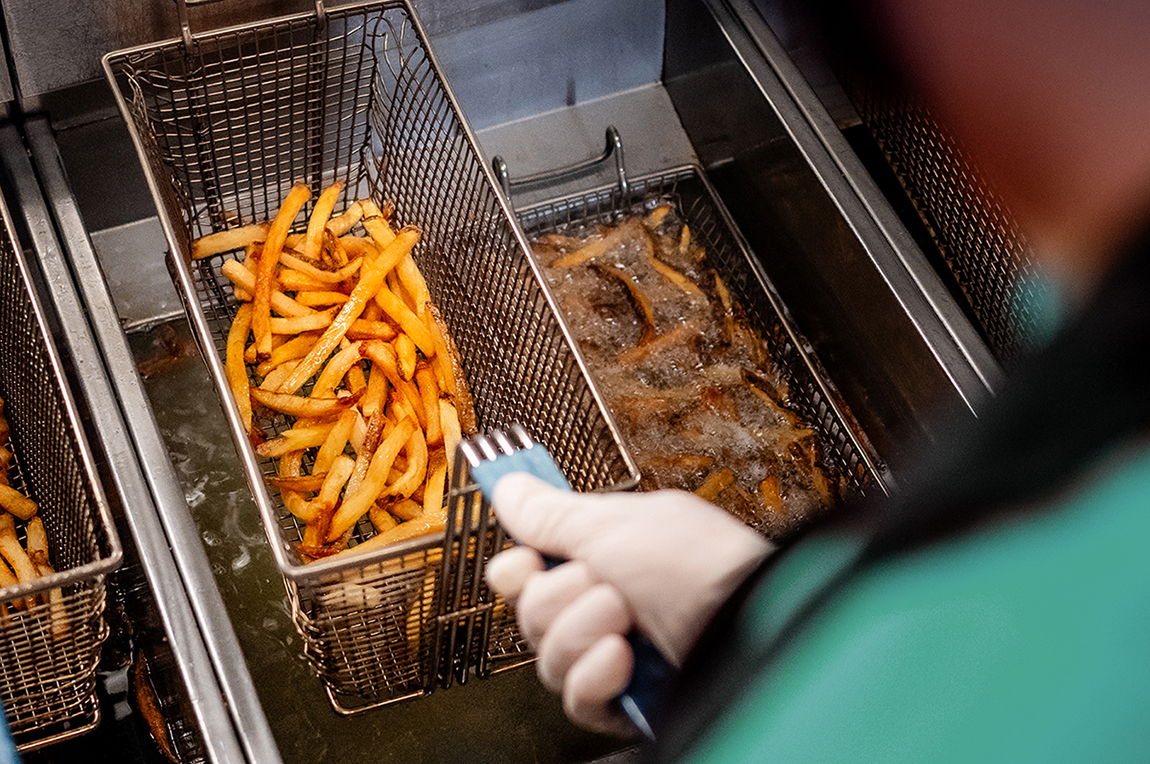No more chewing the trans fat ** Some Valley restaurants are eyeing its health risks and filling their fryers with more wholesome oils.
Copyright Morning Call, Jan 14, 2007
For 40 years people have flocked to Richard’s Drive-ln in Palmer Township, a bubble gum-colored fast-food shrine that dishes fries, hot dogs and cheesesteaks so laden with grease that their white paper wrappers become translucent. Patrons lovingly dubbed it Greasy Dick’s, and one smitten online food connoisseur awarded it three grease spots for gastrointestinal greatness.
So it’s ironic, to say the least, that the three families who jointly own the drive-in are at the forefront of the latest culinary revolution: ridding their fare of cooking oils that contain trans fats, artery-clogging stuff so bad for the human heart that New York City has banished it under penalty of law. Other cities, including Chicago and Philadelphia, may follow suit and many chain restaurants, including Starbucks and Taco Bell, have taken the same step.
“Everyone is getting health-conscious,” said Eve Gouskos, who co- owns the original Richard’s Drive-ln and its new Forks Township location with her husband, Dennis, and the Papageorgiou and Soumelidi families. “We thought if we’re going to open a new place, we may as well start out right. It’s going to be better for everyone all around.”
On Thursday, the new Richard’s Drive-ln started cooking fries, pierogies and onion rings in trans fat-free soybean oil. The new oil will be introduced at the Freemansburg Avenue location later this year.
Richard’s isn’t the only business embracing the trend. A small but growing number of Lehigh Valley restaurants are going trans fat- free by eliminating hydrogenated oil, the durable stuff used in heavy doses by the fast-food industry that is the chief source of trans fats.
‘The New York City ban was a shot across the bow for the food industry,” said Jeffrey Kiesel, chief executive officer of Restaurant Technologies Inc., the Minneapolis-based company that supplies Richard’s Drive-ln and other restaurants with cooking oil. “It accelerated the change that was already under way. Trans-fat sensitivity has been growing over the past several years.”
Indeed, it’s been growing since the 1990s, when medical researchers discovered trans fats, used in everything from cookies to chips to fries, raise bad cholesterol and lower good cholesterol. That leads to clogged arteries and contributes to heart disease, the leading cause of death in the United States.
Artificial trans fats are created when hydrogen is added to vegetable oil in a process called hydrogenation to increase a food’s shelf life and the oil’s smoke point during the frying process.
Kiesel said six of the company’s 34 distribution sites across the country now carry trans-fat-free oil, and it’s been available in the Lehigh Valley for the past three months.
“It’s an overflow of the New York City ban,” he said.
Of the 13,000 eateries Restaurant Technologies serves, only about 2 to 3 percent are now using the trans-fat-free oil, but interest is growing, Kiesel said.
“We’re on the verge of doubling every month the number of customers who want the product,” he said. “Over the next two to four years you’ll see the replacement of all hydrogenated oil with” oil that doesn’t contain trans fats.
Bethlehem Brew Works eliminated trans fats from its menu in April, a month after one of the owners, David Fegley, died from heart disease at the age of 33.
“It wasn’t the trans fats that killed him; he had heart problems, but it made us look at what we eat every day,” said Mike Fegley, David’s older brother. “It’s a couple more thousand dollars a year” for trans-fat-free oil, he said, “but we wanted to do the ethical thing.”
Fegley said the restaurant is not passing the price increase along to its customers, who say they appreciate the change.
“It’s the right thing to do,” said David Monaghan of Clinton, N.J., who was lunching at the Bethlehem eatery the other day with Ken MacKenzie of Center Valley. “All of us and business is affected by” the high cost of health insurance.
The men didn’t know the restaurant had eliminated trans fats before they got there, but they were glad it had. Given a basket of french fries cooked in soybean oil to test, both Monaghan and MacKenzie said they couldn’t detect a difference in taste.
‘They certainly don’t seem as greasy,” Monaghan said. “It’s more like they’ve been baked.”
“Everyone loves a good french fry,” added MacKenzie, nibbling on a crispy treat. “If you had a healthier option, most would choose that.”
But not everyone knows how bad trans fats are for your health.
“Patrons of fast-food restaurants tend to be low-income and minority populations that are already at higher risk for obesity, diabetes and heart disease,” said Denice Ferko-Adams, a registered dietitian in Nazareth and president of Wellness Press, a wellness consulting company for businesses. “It is unlikely that this segment of the population is aware that trans fats exist or of the negative health impact it has, especially in relation to heart disease.”
So far, major fast food chains such as Wendy’s, Taco Bell and KFC are using oils that don’t contain trans fats, but McDonald’s and Burger King are still dragging their feet, said Jeff Kronin, spokesman for the Washington, D.C.-based Center for Science and the Public Interest.
‘There’s plenty of restaurants that have made the switch, but not enough,” he said. “When trans fat labeling went into effect in supermarkets last year, companies raced to get trans fats out of their foods. Restaurants don’t have the same kind of labeling incentive to change.”
But even food labels can be deceptive. If an item contains 0.5 grams of trans fats or less, the Food and Drug Administration doesn’t require its reporting on a product’s nutrition facts panel.
“You could eat five things with 0.5 grams and that would be 2.5 grams of trans fats and you wouldn’t know it because all of those things say “no trans fats,’” said Fegley of Bethlehem Brew Works. “That story isn’t being told.”
Stephen Yeager, chef at Ye Olde Limeport Hotel in Limeport, lost about 30 pounds two years ago in part by eliminating trans fats from his diet. “I didn’t feel right that I was cutting this stuff out in my personal life and not at the restaurant,” he said.
So, he got busy trying to find a tasty alternative and settled on canola oil after regular restaurant patrons Roger and Judy Butterfield gave four stars to trans-fat-free fish and chips during a taste test.
“He’d come and say, “What do you think?1 and we said, “Refreshing, not as greasy,”‘ said Roger Butterfield, of Upper Saucon Township. “The taste was enhanced.”
Cedar Crest College’s food vendor, Eat’n Park Hospitality Group, eliminated trans fats from its products in 2005 after working with Penn State University to find a more healthful oil.
Kronin, of the Center for Science and Public Interest, said it’s only a matter of time before hydrogenated oil goes the way of smoking in restaurants. “It’s worse than any other fat in the food supply and we don’t need it,” he said.
KNOW YOUR FATS
Dietary fats play a big role in cholesterol levels, a leading factor in heart disease. When too much low-density lipoprotein (or bad cholesterol) circulates in the blood, it can clog the arteries and cause a heart attack or stroke. High levels of high-density lipoprotein (or good cholesterol) seems to protect the heart, removing bad cholesterol from the circulatory system.
Saturated fats
Saturated fats, the main dietary culprit of high levels of bad cholesterol, are found in beef, pork, lamb, poultry, dairy products made with whole milk, coconut oil, palm oil and palm kernel oil (often called tropical oils), and cocoa butter. The American Heart Association recommends limiting saturated fat intake to no more than 7 percent to 10 percent of total calories a day.
Unsaturated fats
Unsaturated fats are believed to help lower bad and raise good cholesterol levels. They include polyunsaturated fat, which is found in safflower, sesame and sunflower seeds, corn, soybeans and many nuts, and monounsaturated fats, which is found in canola, olive and peanut oils and avocados. The American Heart Association recommends using them in place of saturated fats.
Trans fatty acids
Trans fatty acids, or trans fats, also raise bad cholesterol levels. They are a byproduct of hydrogenation, a process in which hydrogen is added to vegetable oil. Hydrogenated oils extend the shelf life and flavor of foods, but the process turns vegetable oil into a solid saturated fat. Trans fats can be found in vegetable shortenings, some margarines, crackers, cookies, snack foods, and other foods made with or fried in partially hydrogenated oils. It is also found naturally in small amounts in some animal-based foods. The American Heart Association recommends limiting foods that contain trans fats.
Source: Food and Drug Administration, American Heart Association
Reproduced with permission of the copyright owner. Further reproduction or distribution is prohibited without permission.






